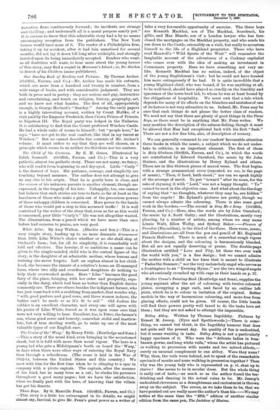Three Boys. By G. Manville Fenn. (Griffith, Farran, and Co.)
—This story is a little too extravagant in its details, we might almost say, farcical, to give Mr. Fenn's great power as a writer of tales a very favourable opportunity of exercise. The three boys are Kenneth Mackhai, son of The Mackhai, Scoodrach, his guile, and Max Blonde, son of a London lawyer who has fore- closed the mortgages on the Mackhai property, and who sends his son down to the Castle, ostensibly on a visit, but really to accustom himself to the life of a Highland proprietor. Those who have read Maxwell's " Wild Sports of the West" will remember the laughable account of the adventures of a Cockney capitalist who comes over with the idea of making an investment in Connemara property. Here we have something not very un- like. Kenneth Mackhai has no notion, indeed, of the object of the young Englishman's visit ; but he could not have treated him more outrageously if he had. It is quite incredible that a young Highland chief, who was bound, if he was anything at all, to be well-bred, should have played so cruelly on the timidity and ignorance of the town-bred lad, to whom he was at least bound by the obligations of hospitality. We must own that a tale which depends for many of its effects on the blunders and mistakes of one of its heroes is not very attractive to us. Indeed, Mr. Fenn may be sure that such things do not please the better class of readers. We need not say that there are plenty of good things in the Three Boys, as there must be in anything that Mr. Fenn writes. We may mention the description of the salmon-fishing, though it must be allowed that Max had exceptional luck with his first " fush." There are not a few fine bits, also, of description of scenery.
We can generally commend to our readers' favourable attention three books in which the music, a subject which we do not under- take to criticise, is an important element. The first of these is Holy Gladness (Griffith, Farran, and Co.), in which the words are contributed by Edward Oxenford, the music by Sir John Stainer, and the illustrations by Henry Ryland and others. There are in this thirteen pieces of sacred verse. The first begins with a strange grammatical error (repeated, we see, in the page of music), " Thou, 0 Lord, hath stood ;" nor can we speak highly of the average of merit. To put "toward" after its noun, for the sake of rhyming it with " Lord," was not a happy thought. " Ye" cannot be used in the objective case. And what about the theology of saying that " no thoughts, whatever they may be, are hidden " from the angels ? Mr. Ryland's pictures are pretty, though we cannot always admire the colouring. There is also some good work in the borders.—The second is Sing Me a Song. (Griffith, Farran, and Co.)—Here, also, the words are by John Oxenford ; the music by A. Scott Gatty ; and the illustrations, mostly very pleasing, by a number of artists, among whom we may name Linnie Watt, Ellen Welby, and Sydney Baker.—Flowers of Paradise (Macmillan), is the third of the three. Here verse, music, and illustrations are all from the pen and pencil of Mr. Reginald Francis Hallward. There is much of a somewhat rough vigour about the designs, and the colouring is harmoniously blended. But all are not equally deserving of praise. The double-page illustration entitled " Love and Pity, let these two ever walk the world with you," is a fine design ; but we cannot admire the mother with a child on her knee that is meant to illustrate " Fades the Summer ;" nor the very melancholy angel who serves as a frontispiece to an " Evening Hymn ;" nor the two winged angels who sit curiously crouched up with cups in their hands on p. 37.






















































 Previous page
Previous page